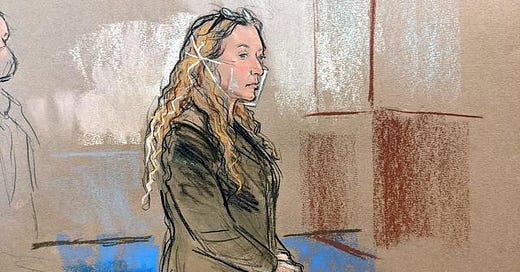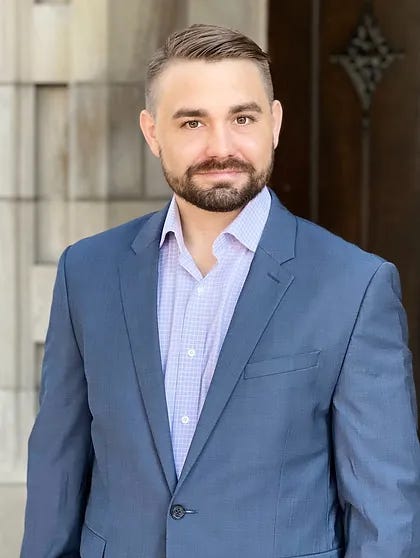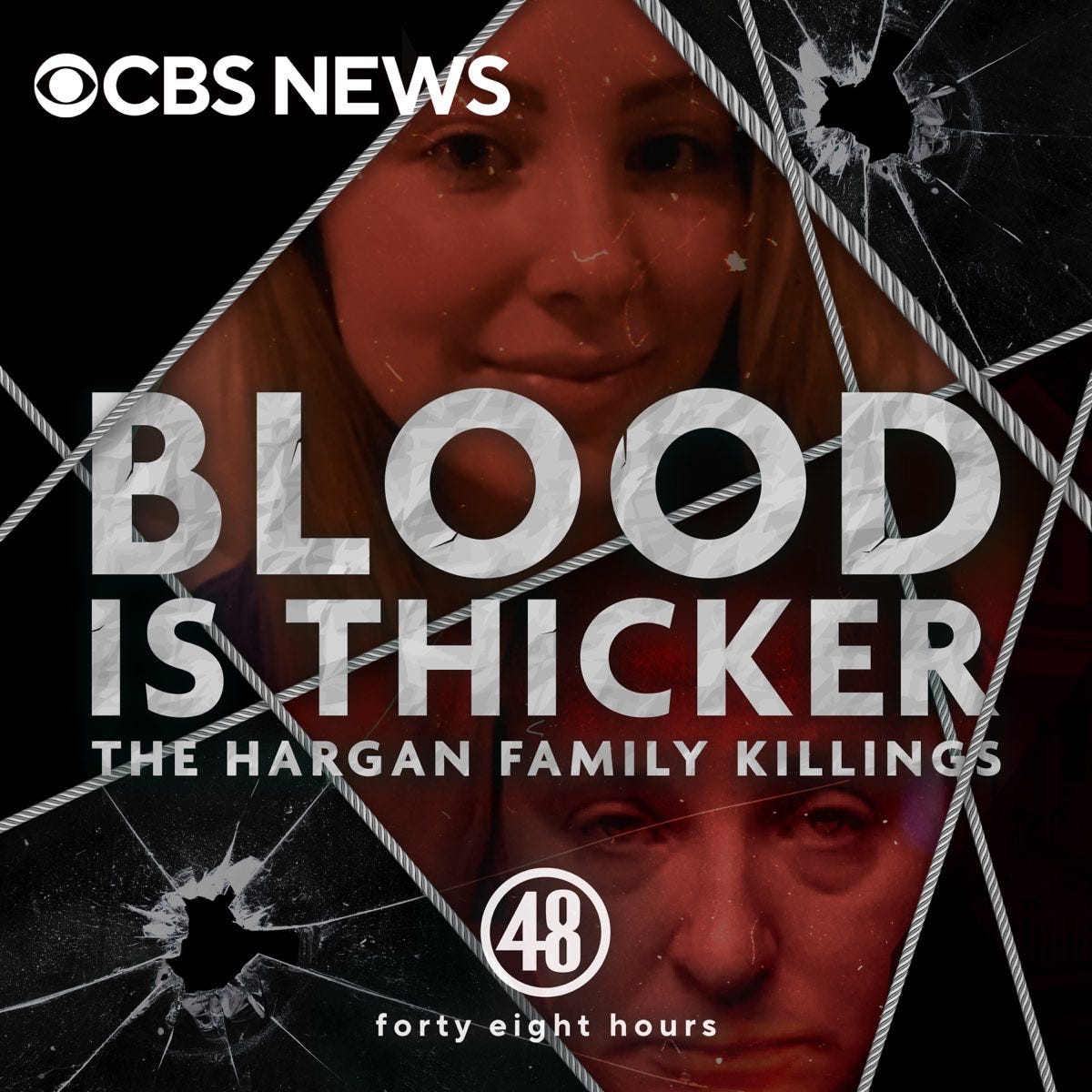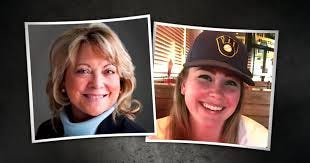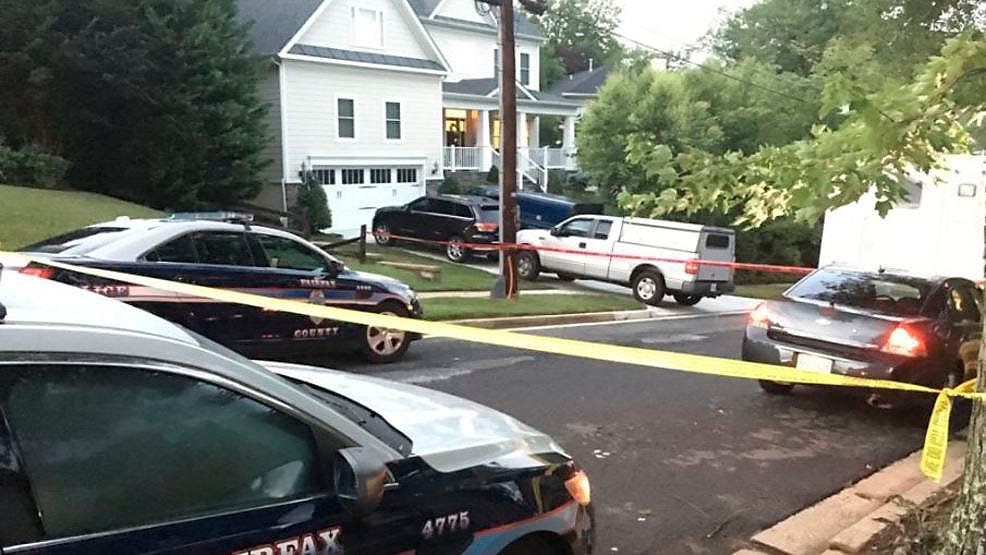A Murder In The Family
A conversation with producer and writer of CBS News 48 Hours hit podcast "Blood is Thicker"
Hello Reader!
I hope you’ve been enjoying your summer and staying safe. It’s a strange and dangerous world out there. Judging by the news alone, I’d encourage that you refrain from dating, eating mushrooms, going out for drinks, hiring your son’s girlfriend, going for a hike, and basically everything else too. .
My summer has been spent mostly with my family, and our newest addition. I’m grateful for the time away with my family. Truly. When in one’s life do you have an entire summer to spend time with your family? I couldn’t have imagined how restorative and cathartic that experience would be for me. I talked about it a bit here, in case you’re curious.
Nevertheless, I’m back and happy to be so. That also means this newsletter is returning with more stories of cults, crimes, and cons. And let me tell you, if you haven’t been reading the news, these stories remain unceasing in their regularity. So watch this space for more.
Today, I’m sharing a conversation with the producer behind one of my most successful projects of the year: the CBS News/48 Hours podcast Blood Is Thicker.
LISTEN TO THE WHOLE SERIES NOW
Millionaire businesswoman Pamela Hargan and her youngest daughter Helen are found dead in their family home in McLean, Virginia. The strange and haunting crime scene puzzled investigators – was it a murder-suicide or was it staged to look like one? There was conflicting evidence all around.
48 Hours correspondent Peter Van Sant examines the suspenseful case in this 6-episode series, Blood is Thicker: The Hargan Family Killings. Detectives try to untangle mixed motives from mother-daughter discord, to sibling rivalry, jealousy and a family fortune. Find out if blood is really thicker when it comes to the Hargan family
Alex Schuman is a host, writer, and producer who spent nine years as a television reporter before entering documentaries. He hosted both the first and fourth season of Sony Music Entertainment’s Smoke Screen, and recently finished producing an upcoming docu-series for HBO. Schuman is working on a new original series while continuing to write and producer podcasts for Sony Music Entertainment and Paramount.
Alex and I have worked together on a number of projects over the years, including our very first original narrative series for Neon Hum, Fake Priest. Alex brings years of experience writing and reporting scam stories, and together with the CBS team, they adapted this unbelievable tale of lies and deception into a hit limited run podcast.
The first in our series of limited run narrative shows from the storied 48 Hours franchise was released this month to much fanfare.
ALEX: Previously I had done these narrative podcasts where the story is always some sort of outlandish, really wild crime. But at the end of the day, there were always systemic failures in these policy discussions that as a political reporter I love to be able to tell, while also telling in a way that's entertaining and will reach, people, and audiences that wouldn't normally listen to something about that kind of policy. And what was different about Blood is Thicker is, you still have this story.
A lot of the stories that I've covered and we've worked together on, are stories about people who say they are something but actually aren't, you know, they're pretending. And so what interested me about Blood Is Thicker was you had Megan Hargan here who had killed her mother and her sister but had decided to make it look like her sister, did it, and then killed herself.
JH: And, there's this other component to the story that you don't always have. A lot of the time, the reporting you're doing is about assembling bits and pieces, you find scraps here and there and try to tell a story that is consistent with a motive and a crime and a behavior. And in this situation, we have the receipts and they're recorded.
And so tell me about how it, what it was like to be able, to work with, that tape with these audio recordings that so clearly reveal her murderous intentions.
ALEX: It's always great when you have an aspect of the story that plays to the medium and for it to be an audio call that catches her, it adds to why, a podcast is the right venue to tell this in a longer format than they could do on TV. And we could really play with those calls and you could really hear the difference.
There were all of these decisions that we could pull from and put throughout the series because there was just so much evidence there.
JH: How do you account for the success of the show? It's a number one show. It sits on the charts for, weeks. It becomes a water cooler moment. It's a story that has been, told, by 48 before.
ALEX: To me it's the combination of the fact that the crime itself is interesting and there are all of these twists and turns within the investigation. But it was also that, we had such, incredible access to the people who literally lived those twists and turns.
JH: And there is something so satisfying as listeners to be, even if you know who the killer is, you know, watching it all go down.
ALEX: We're in this era of citizen detectives and people who will hunt down true crime details on their own. And I think, getting, to go along on an investigation with a detective is something that they find really compelling.
The show climbed the podcast charts right out the gate, and stayed at #1 for several weeks. It’s clear evidence to us that adapting the 48 Hours format into the limited run podcast is a great way to reach fans of 48 and true crime fans alike. But at the end of the day, it’s about the story. Does it grip you, and are you sucked into the world the story takes you into? We caught up recently on the project and why it caught fire.
Let me know, and see you next week.

